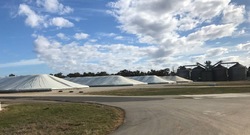North Queensland Register | 12 September 2018
Cargill quits farming ties to big Temora agribusiness as new investors flood in
Cargill quits farming ties to big Temora agribusiness as new investors flood in
by Andrew Marshall
Potential offshore bidders are almost falling over themselves in the scramble for a $300 million-plus NSW farming and farm service business seeking new corporate capital backers.
The intensifying US-China trade war, plus our comparatively cheap agricultural land are among key reasons overseas investor groups have ramped up buying interest in rural Australia this year.
Market observers say the 48,700-hectare BFB Limited grain growing, storage and pig production operation is ticking all the boxes for buyers seeking strategically diverse investments with scale and stable earnings capacity.
Spread from the Riverina to the mid Lachlan Valley, BFB’s business includes a 332,000-tonne grain storage site owned in partnership with global farm commodities giant, Cargill.
Temora-based BFB started out as a trucking company in the late 1980s, expanded into cropping and storage, and now includes the big Moore Park contract grower piggery, plus fuel and fertiliser distribution operations.
The private equity-funded company has amassed 28 properties, employs 81 full-time staff, plus 57 part-time workers, and typically produces about 110,000t of wheat, barley and canola annually.
A further 75,300t of grain storage is held on the various properties, including holdings in the Henty, Gundagai and West Wyalong districts.
(Northern hemisphere investors) see Australian farmland and agricultural production’s value growth as a good long term investment option, and they’re not fazed by the drought
- Greg Quinn, PricewaterhouseCoopers
First round offers from aspiring buyers are due late this month.
“The whole BFB operation is extraordinarily attractive to the sort of interest Australia is drawing from North American and European pension funds and private wealth offices,” said food and agribusiness advisory partner with PricewaterhouseCoopers, Greg Quinn.
“There’s a significant amount of money coming from Canada and the US looking for a home here at the moment.
“They’re investor groups who probably have put money here in the past six or 12 years, but they’ve been getting a lot busier in the past six months or so.
“They see Australian farmland and agricultural production’s value growth as a good long term investment option, and they’re not fazed by the drought.”
Mr Quinn said Australia’s strengthened trade ties and proximity to hungry Asia had lately, conveniently, coincided with rising apprehension about US trade with China and a cooling appetite for agricultural connectivity between the two economic giants.
Australian farms and agribusinesses were well positioned to take advantage of the US business uncertainty, or US investors turning their attention “down under” rather than buying at home.














